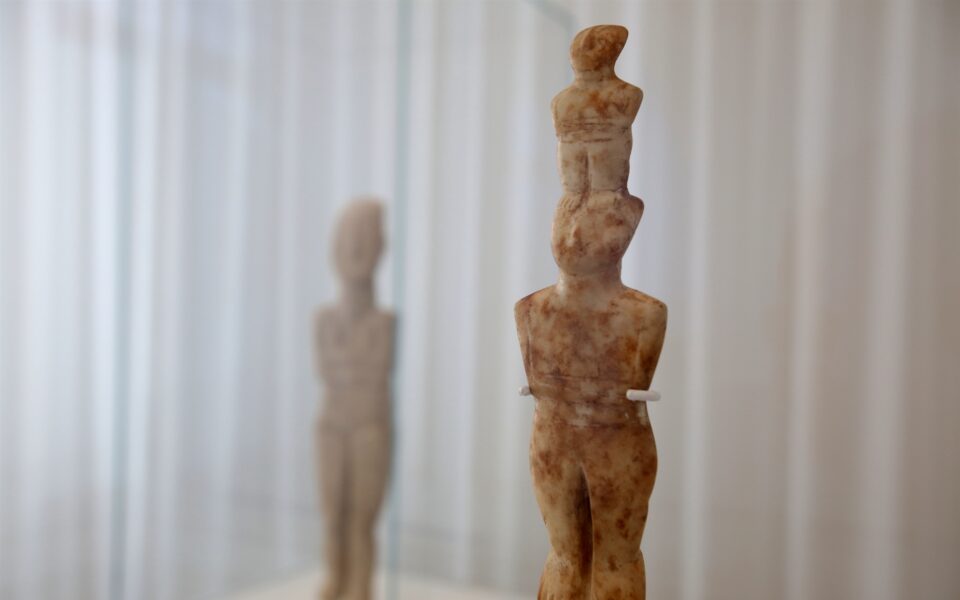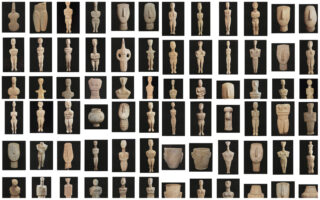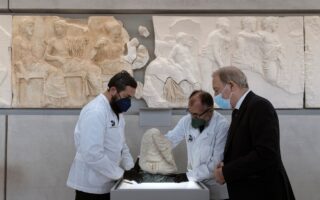‘Repatriation’ or ‘cession’?

The Greek Culture Ministry’s bill for the “repatriation” of 161 Cycladic antiquities from the United States was passed in the Hellenic Parliament, despite justified reactions from archaeologists and the entire political spectrum.
It provides for the temporary exhibition of just 15 objects at the Museum of Cycladic Art in Athens and for one year only. Thereafter the entire collection will be on display at the Metropolitan Museum of Art in New York for 10 years. Then, only 45 objects will be returned to Greece in stages until the end of 2048, on the condition that an equal number of objects from Greek museums of equivalent value are exhibited at the Met. From 2049 and for the next 25 years, either the entire collection will be exhibited at the Met or it will be returned to Greece in exchange for the long-standing loan of 122 Cycladic antiquities from Greek museums to the Met.
In effect, the euphemistic “return” of antiquities to Greece conceals the cession of the possession of a large archaeological collection to a dubious institute based in the US state of Delaware founded by an American mogul and a Greek private museum; the antiquities of the collection or objects of equal value from Greek museums are to be exhibited in New York for 50 years.
The legal implications are enormous. The Ministry of Culture deprived the Archaeological Service and the Central Archaeological Council of their statutory authority to check the authenticity and provenance of the antiquities, the way in which they came into private possession, and the possible connection with networks of illicit trafficking of cultural goods. In essence, it deprives the Hellenic Republic of the possibility to initiate domestic and international procedures – as all post-dictatorship governments have done in similar cases – for the identification of illegally exported antiquities, so that they can be returned immediately and exhibited, on a permanent basis and without trade-offs, in a public museum in Greece.
To put it simply: The agreement was drawn up without any institution of the Greek constituted state having certified the authenticity of the antiquities, the legitimacy of the collection, and country’s benefit from their long-term exhibition abroad. This is in direct contradiction with the scientific and institutional procedures required by the archaeological law of Greece in accordance with the Greek Constitution, with European and international law, and with UNESCO conventions. The blatant circumvention of the legal framework, coupled with obscure aspects of this case and evidence publicized by scholars, has been rightly characterized as granting a legal cover to potential illicit archaeological activity, raising strong concerns about the precedent it sets.
There is also an equally important cultural dimension. Firstly, treating antiquities as individual exhibits, detached from the overall context of Cycladic culture, is scientifically anachronistic and undermines their value. Second, the cooperation of the Greek state with the Metropolitan Museum of Art in New York was not part of a national strategy, cultural and diplomatic, to promote the country and its culture to major museum organizations worldwide, but was entirely opportunistic, dictated by the interests and desires of private individuals.
It is worth mentioning that the same fragmented and unscientific attitude to museum policy lies behind the government plan to transform Greek public museums into legal entities, cutting them off from the Archaeological Service. Thirdly, with this bill the Ministry of Culture in essence inconsiderately adopts the views of the British Museum about the alleged “benefit” of exhibiting archaeological collections in major “international” museums abroad; this undermines the long-standing effort for the reunification of the Parthenon Sculptures.
The agreement was drawn up without any institution of the Greek constituted state having certified the authenticity of the antiquities, the legitimacy of the collection, and country’s benefit from their long-term exhibition abroad
Legal experts identify a serious issue of formal legality, as this is not a special law nor an administrative contract but a ratification of a private agreement that has the form of a simple notarial deed. Consequently, since the agreement is not in line with the Greek archaeological law and the procedures prescribed for the Archaeological Service and the Central Archaeological Council, its ratification is legally “up in the air.”
Whichever Greek government emerges from the next elections and is called upon to manage the implementation of the agreement has two options: either to implement it, turning a blind eye, or to cancel the consequences of its ratification, making good use of the legal issue mentioned above, so that the competent institutions in Greece and abroad can take action. The second option is the one that will put Greece back at the forefront of the global effort to combat antiquities theft and illicit trafficking of cultural goods, restoring its international image as a model country – an image that has been shattered by this agreement.
At the same time, instead of an opportunistic approach, there must be a shift in Greece’s cultural policy and diplomacy toward a comprehensive and coherent planning of cooperation with museums abroad, for instance through temporary exhibitions and other actions, as has been done successfully in the past.
As far as the Cycladic antiquities are concerned, their real repatriation is one: their exhibition in the new public museum of Cycladic culture on the Greek island of Naxos. There and only there will they be organically integrated into the material remains of the great prehistoric Aegean civilization that created them.
Kostas Stratis is an archaeologist and a former deputy culture minister of Greece.





